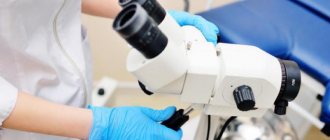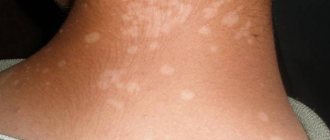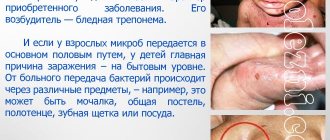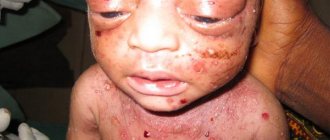Most screening methods involve various blood tests. They are intended for mass examination of people in order to identify dangerous diseases. The technique for performing them (analysis from a vein or finger) and the price of the reagents are so simple and affordable that every state medical institution examines its patients for free. But recently, conflicting data have emerged regarding the blood test for RW. According to them, this research is not always as informative as previously thought.
Indications
A blood test for RW is a common way to confirm or exclude infection of the body with the causative agent of syphilis. The analysis is necessary for all specialists whose professional activities involve direct contact with people or food. As a rule, this diagnostic method is used as part of a medical examination, which is carried out by health workers, children's teachers, cosmetologists, confectioners, hairdressers, cooks, grocery sellers and other specialties.
Pregnant women are also required to take the test. It is usually prescribed upon registration at the antenatal clinic and in the third trimester.
In addition, the study is carried out if there are symptoms of syphilis:
- rashes of unknown origin on the skin and mucous membranes;
- enlarged lymph nodes (especially inguinal);
- ulcerative lesions of the mucous membranes;
- uncharacteristic discharge with an unpleasant odor from the genitals.
It is also recommended to take an RW test for preventive purposes after accidental unprotected sexual intercourse.
Important! If an infection enters the body, its detection is possible only 5–6 weeks after infection. If the test is carried out earlier, the result may be false negative.
How is it done and what kind of blood is needed for analysis?
The material for analysis can be any blood, either from a vein or from a finger. The specificity and reliability of the analysis depends on many factors. It is important to consider that this is a nonspecific test that has a large number of false positive and false negative results. Therefore, it cannot be relied upon with complete confidence in any case. This is due to the fact that blood from a finger can only be examined using the microprecipitation reaction
It allows you to quickly determine the presence of antibodies in the body. But their specificity cannot be determined. Such antibodies can be any proteins formed in large quantities during any infectious processes, immediate or delayed allergic reactions. This means that the true disease can masquerade as a false positive RW and be mistaken for syphilis. On the other hand, venous blood from a finger is not able to detect small concentrations of specific antibodies to the causative agent of syphilis in the initial stages of the disease or during its sluggish course. This causes a false negative result.
Important to remember! The diagnostic value of a finger prick blood test for RW is so low that it makes this method of conducting it impractical in medical practice. More reliable results can only be obtained by examining venous blood. Unlike finger prick analysis, which makes it possible to examine only a small amount of whole capillary blood, plasma can be obtained from venous blood, which contains all the antibodies circulating in the body!
Do not forget about the correctness of the research. It is best to donate blood in the morning or at least on an empty stomach. The day before, strong physical and psycho-emotional stress is excluded. It is advisable to minimize the administration of drugs that affect the activity of the immune response and cause an allergic reaction.
What does Wasserman's reaction show?
According to statistics, with primary infection of the body by syphilis in 90% of clinical cases, the Wasserman reaction will be positive after 6–8 weeks, and with secondary infection in 98–100% of cases after 5–6 weeks.
If you carry out complex diagnostics together with other methods, for example, ELISA (enzyme-linked immunosorbent assay) or RIF (immunofluorescence reaction), you can not only detect the presence of the pathogen in the body, but also determine the approximate date of infection. For the study, blood is taken from a vein from the patient.
To detect the presence of pathogenic microorganisms, a special antigen is introduced into the biological material - cardiolipin from bovine heart. After this, the specialist observes the reaction, the intensity of which indicates the severity of the pathological process.
Analysis results:
- negative;
- doubtful "+";
- weakly positive “++”;
- sharply positive “+++”.
A negative result means the person is not infected. A questionable as well as a weakly positive reaction can occur both in case of infection and in its absence. In this case, a retake of the analysis after a certain period of time or additional diagnostics is required.
A false positive reaction can be observed after vaccination, with tuberculosis, oncological pathologies, diabetes mellitus, hepatitis or pneumonia. In this case, you also need to retake the test or undergo additional studies.
A sharply positive reaction is observed when the body is affected by syphilis, which requires immediate therapeutic measures.
If we talk about how long it takes to do a blood test for RW, it won’t take much time. The procedure itself takes about 5 minutes, and the results will be ready in an hour and a half.
Syphilis. Enzyme immunoassay for the detection of total antibodies of class M and G to the causative agent of syphilis
What kind of analysis is this? This is the detection of total class M and G antibodies to the causative agent of syphilis, which can be used as an effective ultra-sensitive screening test for diagnosing early syphilis infection.
At the moment, the Wasserman reaction is considered outdated, and since 2006 it has hardly been used to diagnose syphilis. It has been replaced by more sensitive and modern tests. However, the forms still display the unchanged “RW”. The signature “RW” is a tribute to tradition, a small unspoken rule among doctors: leaving the old signature, they now have in mind new modern tests for syphilis.
What biomaterial can be used for research? Venous blood
Treponema pallidum (treponema pallidum) is a bacterium that causes syphilis, a chronic venereal infectious disease that is most often transmitted sexually, for example, through direct contact with a syphilitic ulcer (chancroid), intrauterine infection is also possible.
The source of infection is a sick person. Syphilis is easily curable, but can lead to serious health problems if left untreated. An infected mother can transmit the disease to her fetus, which may develop serious and irreversible changes.
Syphilis is classified as a classic sexually transmitted disease (sexually transmitted disease). The causative agent is Treponema pallidum. Syphilis is characterized by a slow progressive course. In later stages, it can lead to severe damage to the nervous system and internal organs
Symptoms of syphilis
The symptoms of syphilis are very varied. They vary depending on the stage of the disease. There are three stages of syphilis:
Primary syphilis occurs after the end of the incubation period. At the site of penetration of the pathogen into the body (genital organs, oral mucosa or rectum), a painless ulcer with a dense base (chancroid) appears. 1-2 weeks after the onset of the ulcer, the nearest lymph nodes enlarge (if the ulcer is localized in the mouth, the submandibular nodes enlarge; if the genital organs are affected, the inguinal ones become enlarged). The ulcer (chancroid) heals on its own within 3-6 weeks. after occurrence.
Secondary syphilis begins 4-10 weeks after the appearance of the ulcer (2-4 months after infection). It is characterized by a symmetrical, pale rash over the entire body, including the palms and soles. The appearance of a rash is often accompanied by headache, malaise, and fever (as with the flu). Lymph nodes throughout the body enlarge. Secondary syphilis occurs in the form of alternating exacerbations and remissions (asymptomatic periods). In this case, hair loss on the head is possible, as well as the appearance of flesh-colored growths on the genitals and in the anus (condylomas lata).
Tertiary syphilis occurs in the absence of treatment many years after infection. This affects the nervous system (including the brain and spinal cord), bones and internal organs (including the heart, liver, etc.).
If infected during pregnancy, the child may develop congenital syphilis.
Complications of syphilis
According to scientific research, in the absence of treatment, about a third of patients develop tertiary syphilis. About a quarter of patients die because of it. Congenital syphilis can cause severe damage or death to the child.
Treatment of syphilis
It is quite complex and requires further long-term observation. It is worth noting that treatment of syphilis in the early stages is not particularly difficult in terms of choosing drugs. The peculiarity of Treponema pallidum is that it still retains sensitivity to penicillin , which is the drug of choice for syphilis.
In case of an allergy to penicillin, antibiotics from a number of macrolides (erythromycin, clarithromycin) or cephalosporins (ceftriaxone, etc.) are prescribed. The drugs are prescribed intramuscularly or in tablets. Treatment of active forms of the disease takes place in an inpatient setting; patients with a latent form can receive outpatient therapy. The duration of treatment depends on the stage of the disease and can take from several weeks to several years.
Antibodies to the causative agent of syphilis
When a person comes into contact with T. pallidum, their immune system reacts by producing antibodies to the bacterium. Two types of antibodies to Treponema pallidum can be detected in the blood: IgM and IgG. In response to T. pallidum infection, IgM antibodies to T. pallidum are the first antibodies produced by the body. They are detected in most patients at the end of the second week of the disease and are present in them in the primary and secondary stages. Class G immunoglobulins to T. pallidum appear in detectable quantities in the blood 3-4 weeks after infection. Their concentration increases and in the 6th week begins to prevail over the concentration of IgM, reaching a maximum, and then remains at a certain level for a long time. Starting from the 4th week, the amount of both types of immunoglobulins in the blood increases, which leads to a positive test result for total antibodies to T. Pallidum. This allows this test to be used for early diagnosis of T. pallidum infection. After effective treatment, the concentration of immunoglobulins gradually decreases, but this happens slowly; in some cases, antibodies can be detected after a year or more. Syphilis can be treated with antibiotics, and it is preferable to use penicillin derivatives. At an early stage, the disease is treated easier and faster. Longer therapy may be needed for patients infected for more than a year.
Why is the analysis carried out?
Increasing and decreasing indicators
For the diagnosis of syphilis. For examination of all pregnant women for preventive purposes (preferably at the first appointment with a gynecologist, when registering).
When is the study scheduled? For symptoms of syphilis, such as chancroid on the genitals or throat. When a patient is being treated for another STD, such as gonorrhea. When managing pregnancy, because syphilis can be transmitted to the developing fetus and even kill it. When it is necessary to determine the exact cause of the disease if the patient has nonspecific symptoms that are similar to syphilis (neurosyphilis). If the patient is infected, they should repeat the syphilis test after 3, 6, 12 and 24 months to ensure that treatment has been successful.
Results/Normal/Transcript of analysis
Reference values (normal values)
Result: negative. S/CO ratio (signall/cutoff): 0 - 0.9.
A positive result means that the patient has a recently acquired infection. However, a negative result does not always mean that the patient does not have syphilis.
Positive result
A positive result in a previously seronegative patient, as well as a significant increase in titers in paired sera taken at an interval of 7 days, indicates a primary infection. Detection of antibodies to treponema in the blood of a newborn helps confirm the diagnosis of congenital syphilis. In addition, the cause of a positive result may be tertiary or latent syphilis.
Negative result
A negative test result may indicate the absence of infection or its early stage when an immune response has not developed. At the same time, the absence of antibodies in a baby born from an infected mother does not exclude a congenital disease, since antibodies may not yet have formed at the time of the study.
Preparing for the test
Do not smoke for 30 minutes before donating blood
What can affect the result of the analysis?
False-positive results may occur with diseases such as HIV, Lyme disease, malaria, systemic lupus erythematosus, some types of pneumonia, as well as drug addiction and pregnancy. And many other somatic diseases.
Important Notes
- The examination for syphilis must be comprehensive and include taking into account the medical history, clinical picture and confirmation of the diagnosis by laboratory data.
- People who are sexually active should consult a doctor about any suspicious rashes or pain in the genital area.
- If a patient is diagnosed with infection, he/she needs to inform his/her sexual partner so that he/she can also undergo examination and, if necessary, treatment.
- With syphilis, the risk of contracting other sexually transmitted diseases increases, including the risk of contracting HIV, which leads to AIDS.
• Syphilis can also be transmitted through blood transfusion through contaminated medical instruments, so testing before hospital admission is very important.
Shapilova N.V.
Where to get a blood test for RW in Moscow
The Otradnoe Polyclinic on Altufevskoe Highway offers a wide range of services, including highly informative tests in a modern laboratory. If you need to take a blood test for RW urgently and anonymously, contact us. Qualified personnel take a responsible approach to their duties and conduct diagnostics in strict confidentiality. The price for the study can be clarified by calling our consultants.
We work for you every day, including weekends and holidays - Mon-Fri from 8.00 to 21.00, Sat-Sun from 9.00 to 21.00. Registration can be made by phone or through a special form on our website.









